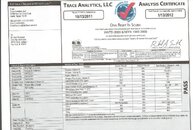Juardis
Contributor
One of the things we learned in our cert class was to ask how the tanks are filled - gas or electric. If gas, ask to see the compressor and make sure the exhaust is lower than the intake. Seems like a good idea, but if it's an established dive shop, do you really need to be concerned about getting bad air? I have no problem asking/demanding I see their compressor, but I wouldn't want to get on their bad side either. Is this a common practice?




